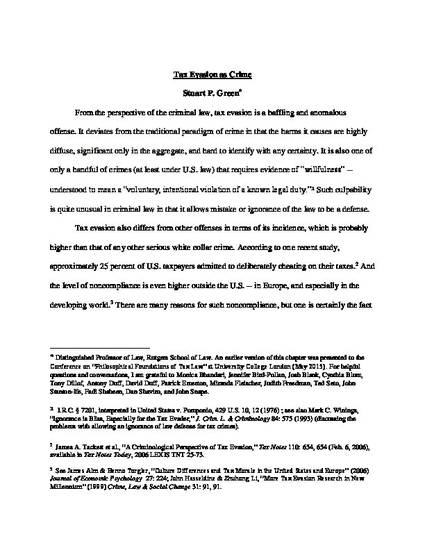
Contribution to Book
Green__Tax Evasion as crime.docx
Philosophical Foundations of Tax Law
(2017)
Abstract
From the perspective of the criminal law, tax evasion is a baffling and anomalous offense. It deviates from the traditional paradigm of crime in that the harms it causes are highly diffuse, significant only in the aggregate, and hard to identify with any certainty. Tax evasion also differs from other offenses in terms of its incidence, which is probably higher than that of any other serious white collar crime. The laws concerning tax evasion are also enforced in a highly irregular and selective manner. Despite, or perhaps because of, such anomalies, tax evasion is a crime that has tended to fall between the cracks of normative analysis. Criminal law theorists have largely avoided the subject of tax evasion altogether, while tax law theorists, though not avoiding the subject as such, have only rarely applied to it the basic tools of criminal law theory. In this chapter, I will seek to do just that, by arguing, first, that an understanding of how taxes differ from fees, fines, penalties, forfeitures, and other types of government assessments is crucial to an understanding of why tax evasion is morally wrong. Second, I will offer an account of the moral content of tax evasion, explaining the role that the concepts of cheating, disobedience to the law, and what I call “deceptive covering up” play in defining its moral content; and why, further, the concept of stealing is largely inapposite. Finally, I will consider the extent to which my analysis of tax evasion might be helpful in assessing the moral content of tax avoidance.
Disciplines
- Criminal Law and
- Tax Law
Publication Date
2017
Editor
Monica Bhandari
Publisher
Oxford U. Press
Citation Information
Stuart Green. "Green__Tax Evasion as crime.docx" Philosophical Foundations of Tax Law (2017) Available at: http://works.bepress.com/stuart_green/9/
